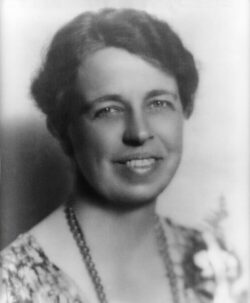Eleanor Roosevelt: A Trailblazer in Women’s History

As Women’s History Month unfolds, it’s only fitting to shine a spotlight on Eleanor Roosevelt, a towering figure whose legacy of activism, advocacy, and compassion continues to inspire generations.
Born on October 11, 1884, in New York City, Eleanor Roosevelt came from a prominent and privileged family. Despite her privileged upbringing, Roosevelt’s early life was marked by tragedy and adversity. Orphaned at a young age and raised by her strict grandmother, she struggled with self-doubt and insecurity throughout her formative years. However, these early challenges would ultimately shape Roosevelt’s character and instill in her a deep sense of empathy and compassion for others.
Roosevelt’s life took a dramatic turn in 1905 when she married Franklin D. Roosevelt, a distant cousin and rising star in New York politics. As First Lady of the United States from 1933 to 1945, Eleanor Roosevelt redefined the role, using her platform to advocate for social justice, human rights, and equality. She traveled extensively across the country, visiting impoverished communities and speaking out against injustice wherever she encountered it.
One of Roosevelt’s most enduring legacies is her tireless advocacy for civil rights and racial equality. At a time when segregation and discrimination were rampant in America, she used her position of influence to challenge the status quo and push for change. Roosevelt’s outspoken support for civil rights legislation and her willingness to confront racism head-on helped to galvanize support for the civil rights movement and paved the way for significant legal reforms.
One of Roosevelt’s most significant contributions to civil rights was her instrumental role in the drafting and adoption of the Universal Declaration of Human Rights. As chair of the United Nations Human Rights Commission, she played a pivotal role in crafting the historic document, which affirmed the inherent dignity and rights of all individuals regardless of race, gender, or creed. The Universal Declaration of Human Rights, adopted by the United Nations General Assembly in 1948, remains a cornerstone of international human rights law and a testament to Roosevelt’s enduring legacy.
Roosevelt’s impact extended beyond the realm of civil rights. She was also a passionate advocate for women’s rights, championing causes such as equal pay, reproductive rights, and political representation for women. Her advocacy helped to lay the groundwork for the women’s movement of the 1960s and 1970s and inspired countless women to pursue leadership roles and make their voices heard in the public sphere.
As we celebrate Women’s History Month, let us honor the remarkable legacy of Eleanor Roosevelt—a woman whose courage, compassion, and unwavering commitment to justice continue to inspire us all. May her life serve as a reminder of the power of empathy, the importance of advocacy, and the enduring quest for a more just and equitable world for all.
Sign up for Kristy's Newsletter!
Get all the updates on upcoming books and events!
